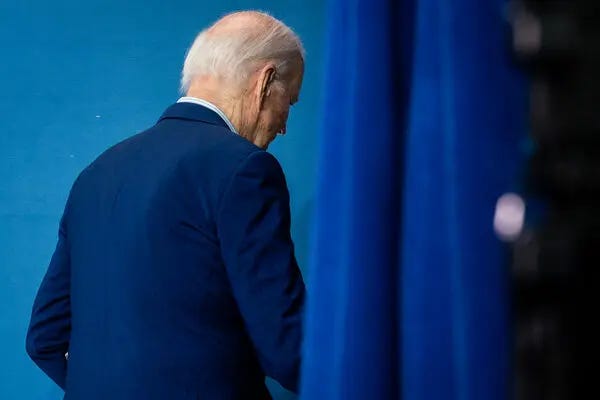I say YES. YOU say NO....Numero Tre! Enjoy!
Comments
-
All in the same boat — bunch of losers and misfits.
4 -
That's how cons work. I hope we on our side are ready for it.
3 -
3
-
2
-
3
-
2
-
4
-
3
-
3
-
1
-
2
-
Idiot speaks.
2 -
4
-
No words what-so-ever.
2 -
Try harder, please.
2 -
2
-
Hope it never goes away either.
1 -
Love all your memes this morning, Jackie, and especially your personal humor. I got a good laugh from your comment on TFG meme showing him saying “I almost died for your sins”. You typed: “Try harder, please.” Hahahaha!
The other meme about the woman on a yacht complaining about food prices is a message I wish more people would notice. I come across this all the time, people complaining about the price of a couple items at the grocery store, and then in the next sentence they’re talking about their vacation plans to Myrtle Beach, or all the crafts they bought in Amish country or the massive amount of toys they’re getting their grandkids for Christmas. They see what they want, I guess.
On the topic of lies, tho, it really doesn’t matter. TFG idiots don’t hear any of them, and never will.1 -
divine, the woman complaining about food prices is Alina Habba. Her complaint likely arises from the fact that trump hasn’t paid her 😂.
4 -
exbrnxgrl, omgosh! I had no idea who she was, so I just now googled her. Geeze Louize! Your comment hit the nail on the head!!!!
2 -
And we have to ask why "ethnic enclaves" exist in the first place. Maybe because of a lack of infrastructure to help integrate new arrivals into our communities? High rental prices in established neighborhoods and HOA's that purposefully exclude families who came over with little to their names? A society highly reliant on cars and driving (with little in the way of affordable and accessible public transportation) which limits the geographic area available to you? So you tend to gravitate to an area that offers familiarity and stability - that provides grocery stores and community resources that specifically meet your needs? Hmmmmm…..
4 -
4
-
5
-
4
-
5
-
We thank you, Joe
Tonight is for you
Robert Reich
Friends,
Tonight’s opening of the Democratic National Convention in Chicago will be an opportunity for the Democratic Party and the nation to take stock of Joe Biden’s term of office and thank him for his service.
He still has five months to go as president, of course, but the baton has been passed.
Biden’s singular achievement has been to change the economic paradigm that reigned since Reagan and return to one that dominated public life between 1933 and 1980 — and is far superior to the one that has prevailed since.
Biden’s democratic capitalism is neither socialism nor “big government.” It is, rather, a return to an era when government organized the market for the greater good.
The Great Crash of 1929 followed by the Great Depression taught the nation a crucial lesson that we forgot after Reagan’s presidency: markets are human creations. The economy that collapsed in 1929 was the consequence of allowing nearly unlimited borrowing, encouraging people to gamble on Wall Street, and permitting the Street to take huge risks with other people’s money.
Franklin D. Roosevelt and his administration reversed this. They stopped the looting of America. They also gave Americans a modicum of economic security. During World War II, they put almost every American to work.
Subsequent Democratic and Republican administrations enlarged and extended democratic capitalism. Wall Street was regulated, as were television networks, airlines, railroads, and other common carriers. CEO pay was modest. Taxes on the highest earners financed public investments in infrastructure (such as the national highway system) and higher education.
America’s postwar industrial policy spurred innovation. The Department of Defense and its Defense Advanced Research Projects Administration developed satellite communications, container ships, and the internet. The National Institutes of Health did trailblazing basic research in biochemistry, DNA, and infectious diseases.
Public spending rose during economic downturns to encourage hiring. Antitrust enforcers broke up AT&T and other monopolies. Small businesses were protected from giant chain stores. Labor unions thrived. By the 1960s, a third of all private-sector workers were unionized. Large corporations sought to be responsive to all their stakeholders.
But then America took a giant U-turn. The OPEC oil embargo of the 1970s brought double-digit inflation followed by Fed Chair Paul Volcker’s effort to “break the back” of it by raising interest rates so high that the economy fell into deep recession.
All of which prepared the ground for Reagan’s war on democratic capitalism. From 1981 onward, a new bipartisan orthodoxy emerged that markets functioned well only if the government got out of the way.
The goal of economic policy thereby shifted from the common good to economic growth, even though Americans already well-off gained most from that growth. And the means shifted from public oversight of the market to deregulation, free trade, privatization, “trickle-down” tax cuts, and deficit reduction — all of which helped the monied interests make even more money.
The economy grew for the next 40 years, but median wages stagnated, and inequalities of income and wealth surged. In sum, after Reagan’s presidency, democratic capitalism — organized to serve public purposes — all but disappeared. It was replaced by corporate capitalism, organized to serve the monied interests.
**
Joe Biden revived democratic capitalism. He learned from the Obama administration’s mistake of spending too little to pull the economy out of the Great Recession that the pandemic required substantially greater spending, which would also give working families a cushion against adversity. So he pushed for and got the giant $1.9 trillion American Rescue Plan.
This was followed by a $550 billion initiative to rebuild the nation’s bridges, roads, public transit, broadband, water, and energy systems. He championed the biggest investment in clean energy sources in American history — expanding wind and solar power, electric vehicles, carbon capture and sequestration, and hydrogen and small nuclear reactors. He then led the largest public investment ever made in semiconductors, the building blocks of the next economy. Notably, these initiatives were targeted to companies that employ American workers.
Biden also embarked on altering the balance of power between capital and labor, as had FDR. Biden put trustbusters at the head of the Federal Trade Commission and the Antitrust Division of the Justice Department. And he remade the National Labor Relations Board into a strong advocate for labor unions.
Unlike his Democratic predecessors Bill Clinton and Barack Obama, Biden did not reduce all trade barriers. He targeted them to industries that were crucial to America’s future — semiconductors, electric batteries, electric vehicles. Unlike Trump, Biden did not give a huge tax cut to corporations and the wealthy.
It’s also worth noting that, in contrast with every president since Reagan, Biden did not fill his White House with former Wall Street executives. Not one of his economic advisers — not even his treasury secretary — is from the Street.
The one large blot on Biden’s record is Benjamin Netanyahu. Biden should have been tougher on him — refusing to provide him offensive weapons unless Netanyahu stopped his massacre in Gaza. Yes, I know: Hamas began the bloodbath. But that is no excuse for Netanyahu’s disproportionate response, which has made Israel a pariah and endangered its future. Nor an excuse for our complicity.
***
One more thing needs to be said in praise of Joe Biden. He did something Donald Trump could never do: He put his country over ego, ambition, and pride. He bowed out with grace and dignity. He gave us Kamala Harris.
Presidents don’t want to bow out. Both Richard Nixon and Lyndon Johnson had to be shoved out of office. Biden was not forced out. He did nothing wrong. His problem is that he was old and losing some of the capacities that dwindle with old age.
Even among people who are not president, old age inevitably triggers denial. How many elderly people do you know who accept that they can’t do the things they used to do or think they should be able to do? How many willingly give up the keys to their car? It’s not surprising he resisted.
Yet Biden cares about America and was aware of the damage a second Trump administration could do to this nation, and to the world. Biden’s patriotism won out over any denial or wounded pride or false sense of infallibility or paranoia.
For this and much else, we thank you, Joe.
3 -
Ethnic enclaves… why is the assumption that this as a bad thing? Although I understand the reasons that were given as to why these enclaves exist, their mere existence is far more complex than high rental prices, lack of public transport, etc. I grew up in an ethnic enclave filled with fairly recent immigrants, including my own family. Our enclave provided a supportive transition into a new language, culture, religion, etc. My grandmother, who never learned English, was able to shop, socialize, and build a good life for herself within the confines of that enclave. As is common with successive generations, the enclave slowly changed and new immigrants moved in.
I currently live in an area of San Jose that was once known as Little Portugal but the major Portuguese migration (mostly from the Azores) has passed and now we are a Vietnamese (we are an official Little Saigon) ,Indian, and Hispanic enclave. We also have one of the last remaining Japan Towns in the US. As immigration patterns change and successive generations move on, these ethnic enclaves change as well.Clearly, if ethnic enclaves function to limit people, that isn’t a good thing. However many ethnic enclaves serve as a familiar touchstone to new immigrants and can also function as a cultural/linguistic and historical repository for various ethnic groups. I often think of how much poorer, and uninteresting, our society would be without ethnic enclaves. These differences enrich our society but we do need to respect those differences so they don’t further divide or limit us.
4 -
I completely agree with you regarding ethnic enclaves, exbrnxgirl. As long as they are empowering instead of limiting, they are a positive, supportive way for immigrants to slowly assimilate into their new country, without losing their heritage or traditions.
Here in L.A., we don't have Japantown, we have Little Tokyo, one of the most beautiful and historic parts of our city. We also have Chintown, Olvera Street (one of the oldest streets dating to our Spanish Colonial past), Koreatown (known as K-town- super hip and trendy) Filipinotown, Little Armenia, Little Bangladesh, Little Ethiopia,and probably a couple more I've forgotten. All vibrant, thriving communities, with great food. I love my city.
2 -
Vive le difference! I purposely moved to an area of overlapping enclaves because I enjoy the diversity. I raised my children in a much more ethnically homogeneous upscale town (Los Gatos) simply because they of good schools. I also understand my privilege in being able to do that because although I am a minority, it’s not easily visible.
2 -
The single most empowering thing we can do for ourselves is to transform fear. While fear contains tremendous power, it doesn't propel us forward and upward, but, rather, drags us down and chains us to the past. Freeing ourselves from fear is a loving intention because, as fear subsides, we are better able to access the soft, sweet power of our hearts, which naturally leads to loving ourselves and others more freely and completely.
Sue Patton Thoele
0






















